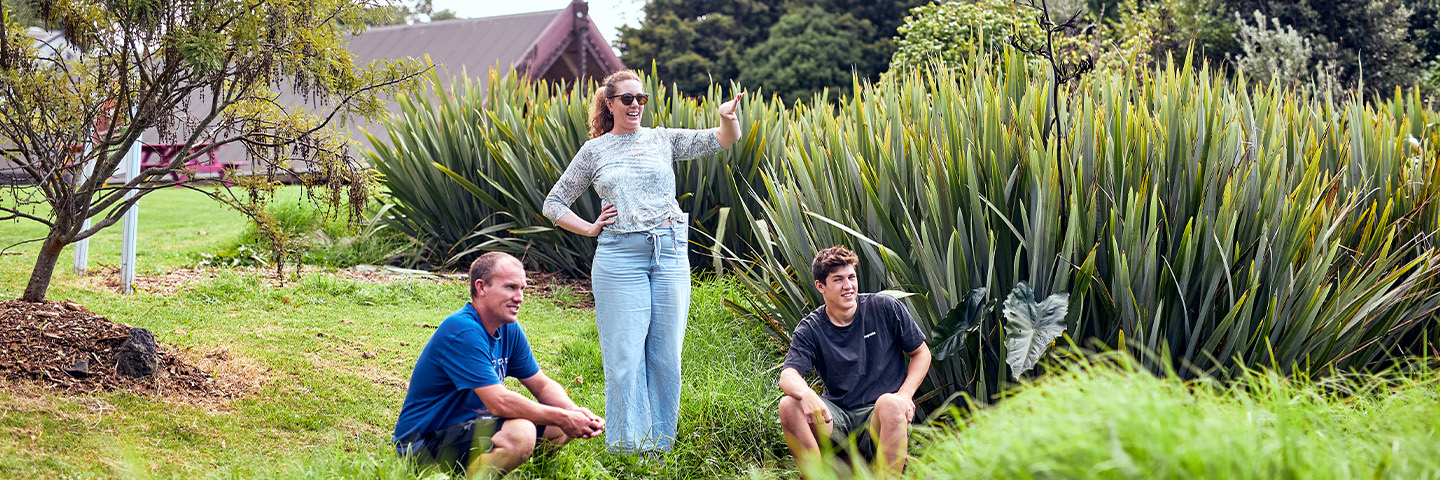Programme overview
Are you currently practicing in the field of landscape architecture, architecture or design, or do you have a degree in landscape architecture? The Master of Landscape Architecture is a qualification for people who have practiced or studied in one of these areas and want to advance their skills and explore an area of their interest. In this master’s by project, you’ll advance your knowledge of current design techniques and learn to present your work effectively to interdisciplinary audiences.
The Master of Landscape Architecture offers landscape architects and graduates the chance to carve out a particular focus of investigation. It’s a ‘research through design’ programme created to contribute to the landscape design discipline as well as your own professional development. The key outcome of this programme is a master level project that demonstrates your specialised skill and/or knowledge in your area of chosen expertise.
There are three possible pathways through the master’s, each with an emphasis on developing hands-on experience:
- Develop a research proposal focusing on a specific area that you’re passionate about
- Work with a member of our faculty to develop a collaborative research project
- Develop a research project with a leading Auckland landscape practice
Highlights
- 24 hour access to workspaces for full-time students in our refurbished studio
- Access to quality digital design tools
- Can enable practicing landscape architects to study part-time, learn new techniques, sharpen their design skills and keep abreast of current theory
- Focus on practical projects: the degree is “by project”, which means that you undertake a project based on an aspect of your landscape architecture practice to date
- No coursework
- Collaborative approach: the Master of Landscape Architecture together with the Master of Architecture, is part of a suite of design programmes at Unitec. Students in both programmes get together for seminars and workshops in order to foster collaboration, new ideas and new approaches to interdisciplinary practice.
- Interaction and feedback with international academics and practitioners
Seminars and workshops
You don’t need to have a fully developed research project when you begin this programme. Once you start, you’ll have 6 weeks to refine your research proposal. During this time, you’ll complete a seminar series that explores current design theory and practice, helping you develop your research question and draft a research proposal.
You’ll then present your draft proposal at a workshop, where you’ll receive feedback from your peers, tutors, and invited industry experts. If your proposal is approved, you’ll move on to a series of workshops where you’ll present your work in progress for critique and evaluation by architects, landscape architects, and designers. These workshops are designed to push you beyond current models, trends, and preconceptions, encouraging innovative thinking.
Throughout the year, you’ll also have opportunities to attend sessions to discuss and refine your project. These workshops are open to other students, staff, industry professionals, and the public, creating a collaborative and inspiring learning environment.
See our previous and upcoming critique workshops on our blog.
Scholarships and Awards
We want to manaaki student success wherever we can – and scholarships are one of the ways we can do that. We have scholarships that recognise the achievements and challenges of dedicating yourself to learning.
- Check out the Master of Landscape Architecture Scholarship
- Each year a scholarship is given to Unitec by the family of pioneering landscape architect Fred Tschopp. Find out more about the The Fred Tschopp Senior Scholarship.
Meet with us
Students who didn’t study their undergraduate degree with Unitec will need to meet with an academic to discuss their professional background, which may require a review of your academic and/or professional portfolio.
Qualification
Once you’ve successfully completed this programme you’ll receive the qualification: Master of Landscape Architecture.
This qualification is a research master’s, not an accredited postgraduate programme so you will not be able to become a registered Landscape Architect.
Hear more from us
- View our stories, previous and current research and event on the Unitec Landscape/Architecture blog
Admission requirements
What you will need to study this programme.
Domestic students
International students
Academic requirements
You must have completed at least one of the following:
- A recognised undergraduate degree with an average grade of B- or higher in all level 7 courses, in a discipline appropriate to the proposed project; Or
- A recognised postgraduate diploma in a discipline appropriate to the proposed project, with a B- average
And English entry requirements;
If English is not your first language, you will also need at least one of the following qualifications:
- Evidence of an IELTS (Academic) band score of at least 6.5 with no band score lower than 6
- University Entrance Literacy: 8 credits at Level 2 or above in English or Māori (4 in Reading, 4 in Writing); or
- Evidence of English language proficiency as outlined in the NZQA Rules on the Unitec English Language Requirements for International Students Web-page.
Non-Academic requirements
- Students who did not complete their undergraduate degree with us will need to submit a CV and professional portfolio. In some cases, we may also require an academic discussion to learn more about your professional background.
Please note: Your portfolio file may be too large to upload directly to our enrolment portal. If that’s the case, please upload a Word or PDF document that includes a link to your portfolio (e.g. Google Drive, Dropbox, or another file-sharing platform).
Don’t meet these Academic requirements?
- If you don’t meet the academic criteria, our Bridging Education Programmes can help you qualify. Simply apply online, and we’ll discuss your next steps.
- If you don’t meet the above criteria, special or discretionary admission may apply; your eligibility will be determined at the interview.
For more information, download the programme regulations (PDF 74 KB)
Courses and timetables
Design Research Project – Landscape Architecture (LAND9000)
Credits: Level: 9
Credits: 0.0 (0 EFTS)
Compulsory: Yes
Aim: The aim of the programme is to produce graduates who have developed a theoretically sophisticated understanding of design through engagement in research by design. The students are expected to develop this understanding by undertaking a research project which involves creating a new body of work within a theoretical context and then critically appraising the new work and the theoretical framework which informed it.
Pre-requisites / Co-requisites: Enrolment requirement for course LPSC9000
Timetable: Your timetable negotiated with your Academic Leader, Matthew Bradbury.There are no classes on public holidays.

